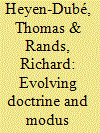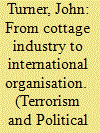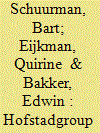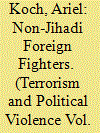|
|
|
Sort Order |
|
|
|
Items / Page
|
|
|
|
|
|
|
| Srl | Item |
| 1 |
ID:
188001


|
|
|
|
|
| Summary/Abstract |
In his November 2018 article, “The Salafi Worldview and the Hermeneutical Limits of Mainstream Sunni Critique of Salafi-Jihadism” in Studies in Conflict & Terrorism,1 Adis Duderija argues that “mainstream Sunnism” shares “the Salafi worldview” as well as certain “epistemological, hermeneutical, interpretational and methodological mechanisms” and “modes of reasoning” in common with the ideology of the “Islamic State” (IS)2 as presented in the group’s magazine Dabiq. (I will refer to this argument as Thesis 1.) For the author, the consequence of those theological “affinities” and similarities between mainstream traditionalist Sunnism and the IS religious ideologies is that the former is incapable of invalidating, countering, rebutting the latter (of rendering the beliefs and violent and harmful practices of Salafi-jihadist groups like the IS “hermeneutically unreasonable”) on matters such as enslavement of female captives, apostasy, or terrorist violence, because both religious cultures (mainstream Sunnism and IS ideology) share too much in common.
|
|
|
|
|
|
|
|
|
|
|
|
|
|
|
|
| 2 |
ID:
184183


|
|
|
|
|
| Summary/Abstract |
A violent extremist group poses a significant threat to parts of Cabo Delgado province. Since its first major attack in October 2017, it has perpetuated a conflict to the detriment of sections of the population and government, as well as disrupting economic development. Little is known about the group and there is a considerable amount of confusion in policymaking and academic circles about the nature of the violent extremists (VE) and their relationship to the wider global Salafi-Jihadi community. By analysing the theological underpinnings of VE and their action in Cabo Delgado (CD), we bring clarity to this debate to enable international actors and policymakers in Mozambique navigate the complexities of the situation. From this analysis we conclude the following: VE are not Salafi-Jihadis as they do not share their ideological and theological understanding of the world. It is more accurate to present VE as challengers to the established order. Their struggle is best understood as a challenge to authorities to secure increased political and religious representation, and socio-economic benefits in CD.
|
|
|
|
|
|
|
|
|
|
|
|
|
|
|
|
| 3 |
ID:
099657


|
|
|
|
|
| Publication |
2010.
|
| Summary/Abstract |
Al Qaeda after the invasion of Afghanistan can now be understood as not only an international terror organisation but an ideology which inspires groups with similar goals of a supranational caliphate. The Al Qaeda ideology draws from long standing historical Islamic concepts that date to the time of Muhammad. The ideologues of the organisation, most notably Ayman al Zawahiri, have cleverly used these ideas and the works of other Islamists to create not just a terror organisation but an ideology designed to unite disparate groups of Islamic radicals around the world.
|
|
|
|
|
|
|
|
|
|
|
|
|
|
|
|
| 4 |
ID:
142529


|
|
|
|
|
| Summary/Abstract |
Despite the Dutch Hofstadgroup's status in the literature as a prime example of a homegrown Salafi-Jihadist terrorist network, the authors, using newly available primary sources, argue that this classification is to a large extent unwarranted. The lack of a rudimentary organizational structure, the existence of divergent views on the legitimacy and desirability of political violence, and the absence of collective action in pursuit of a violent goal rule out labeling the Hofstadgroup as a terrorist organization or network for the largest part of its 2002–2005 existence. A smaller subgroup of extremists did begin developing into a proto-terrorist inner circle from late 2003 onwards. In 2004, this extremist core brought forth the murderer of filmmaker Theo van Gogh. But it was only in 2005, when the remnants of the inner circle tried to resuscitate the Hofstadgroup in the wake of the arrests that had followed Van Gogh's death, that these individual actions were replaced by the communal efforts necessary to warrant the “jihadist network” label often ascribed to the Hofstadgroup. Arguably the most archetypical aspect of the Hofstadgroup case is its ability to illustrate the deleterious effects of the ongoing scarcity of primary sources-based research on terrorism.
|
|
|
|
|
|
|
|
|
|
|
|
|
|
|
|
| 5 |
ID:
188002


|
|
|
|
|
| Summary/Abstract |
Given that this exchange takes place in an academic setting I will have to start this rejoinder by pointing out that Alain Gabon is neither an Islamic Studies nor Religious Studies scholar. This is important to keep in mind because, if Gabon was such a scholar, he would realize that much, if not all, of his purported critique, given the nature and aims of my article and all of my relevant scholarship in general, is simply misplaced, to put it mildly, or is aimed at intentionally trying to mischaracterize both my scholarship and intentions/motivations behind it (for reasons unknown to me) as will be discussed below. Given that my article focuses on the hermeneutical limits of mainstream Sunnism in countering the theological, epistemological, conceptual, and interpretive (i.e., manhaj-based) aspects of Salafi-jihadism, its main argument can/should only be critically evaluated/appreciated by those scholars who are either.
|
|
|
|
|
|
|
|
|
|
|
|
|
|
|
|
| 6 |
ID:
178937


|
|
|
|
|
| Summary/Abstract |
The ongoing war in Syria reflects the interesting phenomenon of foreigners flocking to the troubled region to join the combat. While foreign Jihadists joining the fighting ranks of terror organizations such as the Islamic State or Al Qaeda have attracted considerable reporting and research, the flip side of this phenomenon has gone largely unnoticed—that of the foreign anti-ISIS fighters. Although these fighters share a common enemy, adversary on the battlefield, they hold disparate personal ideologies and motives. This article will examine manifestations of foreign anti-ISIS fighters affiliated with both the far right and far left ideologies, in order to contribute to the understanding of this unfamiliar aspect of the war in Syria and its scope, as well as the potential consequences and potential threats it embodies.
|
|
|
|
|
|
|
|
|
|
|
|
|
|
|
|
| 7 |
ID:
171810


|
|
|
|
|
| Summary/Abstract |
This article explores the relevance of the dominant, population-centered, counterinsurgency doctrine in an era dominated by Salafi-inspired state challengers. Building on Weinstein's (2007) argument, I argue that an insurgent group's emergent nature, shaped by its origin, affects how it will operate and the kind of strategy most likely to defeat it. I investigate the plausibility of my claims through an examination of Boko Haram. I demonstrate the disconnect between Boko Haram's Salafi ideology and its objective of establishing a caliphate, on the one hand, and the strategy of dialogue and socioeconomic reforms to end the insurgency, on the other. In light of this disjuncture, I argue that the key to Boko Haram's defeat lies in the mobilization of international military and intelligence resources to strengthen the Nigerian government's enemy-centered counterinsurgency operation against the group.
|
|
|
|
|
|
|
|
|
|
|
|
|
|
|
|
| 8 |
ID:
188003


|
|
|
|
|
| Summary/Abstract |
This article contests assertions in Alain Gabon’s response to Adis Duderija’s article “The Salafi Worldview and the Hermeneutical Limits of Mainstream Sunni Critique of Salafi-Jihadism.”1 I demonstrate that Gabon’s response is problematic in three ways: he dismisses legitimate challenges and the debates they have engendered in the field; entirely misses the point of the original article by refuting an argument the original article did not make; and provides a weak refutation that does not withstand scrutiny.
|
|
|
|
|
|
|
|
|
|
|
|
|
|
|
|
|
|
|
|
|